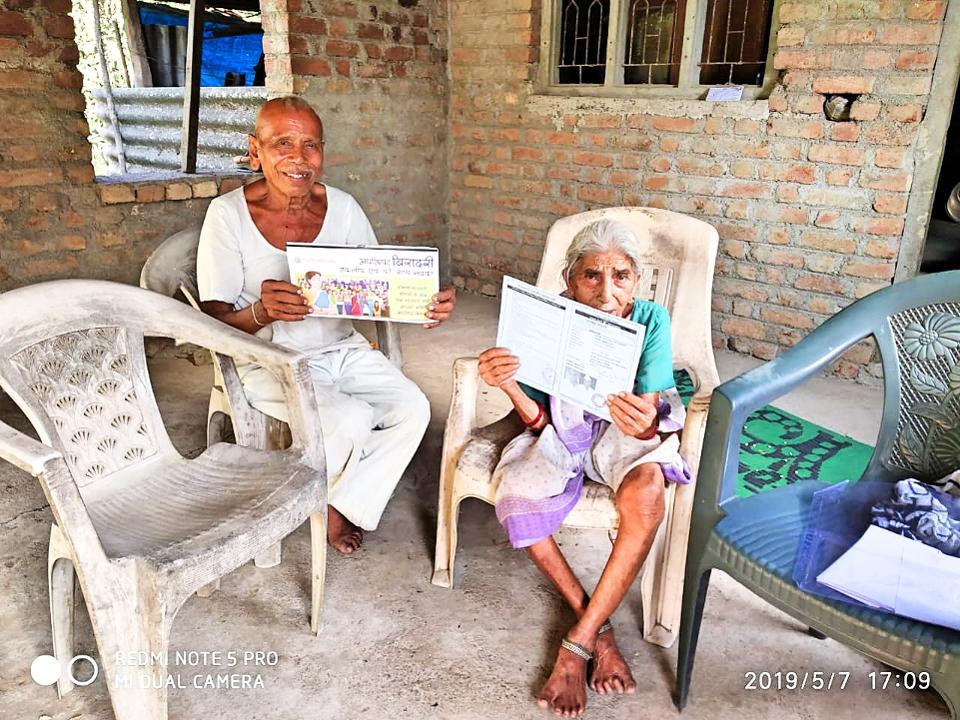
A couple in tribal Gujarat show their Uplift membership cards. They are excluded from mainstream insurance in India because of their age.
Ashoka
In India, 90% of the workforce is in the unorganized sector, with employers who are not registered with the government and employment terms that are often irregular and unpredictable. Many of these citizens earn two to six USD per day and have limited access to social protection systems including insurance. Accidents and disease are destabilizing for families and can cause further poverty, since insurance is not a priority expense for them. The existing health insurance in India is basically only useful when someone is sick. Since this model provides no incentive to stay healthy, marginalized families see no reason to invest in their health. In turn, this mindset puts many families in dire situations when they do get very sick or injured and suddenly have expensive medical bills or take loans at 10% per month, sometimes causing families to pull their female children out of school, among other indirect consequences.
To address these issues, Kumar Shailabh created an alternative risk-pooling health protection mechanism that incentivizes being healthy. He realized that insurance designed to serve the base of the pyramid, which is the majority of the Indian population, would need a preventive, value-for-money approach that is people-centered. Therefore, his organization Uplift Mutuals is distinctive because it is a mutual microinsurance model that is designed, co-owned, and led by women and is focused on preventive health. The insurance plans function as a pure mutual where the members/clients are also the owners (they sit on the Board with Shailabh). They take part in designing the product and processes and are also the key decision makers for claims, thus empowering them to make decisions about their own health and their families’ health.
Shailabh has learned a lot since he co-launched the first version of Uplift Mutuals with a group of microfinance practitioners and an actuary in 2004. “We decided that we would set up a health mutual that was community-owned and managed by women from the slums of Pune, India. We went with the same design as the commercial health insurance at that time, where one could not enroll past 70 years old – and if you were young, you paid less and more if you were old. We had just explained to our members these principles of insurability, and these women said ‘Shailabh, do we really control our age?’ You know, there was this blow to my common sense. So now our product does not have age-based barriers. We have one premium whether you are three days old, three years old, or 85 years old, and age is not an entry barrier.”
Uplift Mutuals’ current claims ratio is one of the most sustainable in India. Around 2% of their members file claims, resulting in part from the fact that 70% of their members access their primary and preventative healthcare services. These would be out-of-pocket expenses on outpatient care, which Uplift Mutuals reduced by 2.2 million rupees last year, across all their members. In partnership with the Finish tech company TIETO, Uplift is one of the first mutual microinsurance companies in India to have an end-to-end tech platform that allows a geographically diverse claims committee to view claims virtually, which has dramatically improved their average time to settle a claim from 35-40 days to two hours. They also have the first member/client app available in local languages.
The model uses value-added preventive healthcare services as a mechanism to contain the rate of claims. Shailabh has successfully created access to the healthcare ecosystem for the policyholders, and therefore Uplift Mutuals is not just restricted to making financial compensations to policyholders but is enabling them to take charge of their health. Through claim benefits, discounts on hospitals, outpatient care, drugs, diagnostic services, health camps, and regular free checkups, Shailabh is improving their access to care. As a result, they are incentivized to visit Uplift doctors early when they fall ill, thus reducing their medical expenses. Accessing quality healthcare at the best price possible (which can be a bit of a nightmare) is now feasible for these families because of Uplift’s 24/7 helpline and health care network designed to navigate the often-opaque health care system that disadvantages the poor.
After 14 years of learnings and iteration with 350,000 members covered across nine different communities in urban, rural, and tribal geographies, Shailabh feels the journey has just begun as he has now embarked on scaling this model, including enabling many communities to pool their risk together. This year, he has also started an experiment to take this mutual health insurance to children studying in schools so that he can build a future where people understand the need for health insurance when they grow up.
As Uplift Mutuals aims to grow across geographies and communities, technology will allow them to keep costs low and make it more transparent, efficient and effective. Uplift Mutuals aims to reach a million lives within the next five years. “We need a lot of help to make this possible because we want to reach to a number that has not been seen in India, and that cannot be done alone,” says Shailabh. “We need access to philanthropic capital, and we need people with tech backgrounds to help us.”
The Philips Foundation’s Accelerating Healthcare Access and Boehringer Ingelheim’s global initiative Making More Health are working together with Ashoka to support and scale Shailabh’s work.
The article was origianlly posted at: %xml_tags[post_author]% %author_name% Source%post_title%
